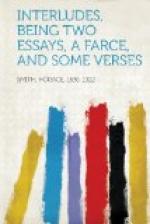“By heavens, this is too bad!” exclaimed Colonel Bagshaw. “I declare nothing has happened that I know of, except that my wife has forgotten to count honours.”
“It is a lie, sir, and you know it. You are trying to ruin a woman before my very eyes. Oh, you man, you brute! Oh, help, help me, help!” and in act to fall she steadied herself by clenching tightly the back of her chair. Her daughter was luckily close to her, “Oh, mamma, mamma,” whispered she, “how can you say such things? Come away, come away; you are ill. Do come.” She led her out into the hall, and hurriedly adjusting the shawls, went home with her mother.
Porkington showed himself a man. He took Colonel Bagshaw by the hand. “I am very sorry,” said he, “that Mrs. Bagshaw should have made some mistake. Some sudden vexation, and I am afraid some indisposition, must be the cause of her excitement. Allow me to take her place and finish the game. I am afraid you will find me a poor performer, Colonel.”
“Oh, not at all. Let us begin. I will deal again, and the scoring stands as it did.”
Mrs. Porkington during this scene had turned pale and red alternately. Her husband’s dignity and presence of mind astonished her. She was so excited as to be almost unable to play her cards, and her lips and eyes betrayed very great emotion. The tutor’s cheek showed some trace of colour, and his manner was even graver than usual, but that was all; and his wife felt the presence of a superior force to her own, and was checked into silence. I had always felt sure that there was a reserve of force in the timid nature of our Coach which seemed to peep forth at times and then retire again. It was curious to mark on these rare occasions how the more boisterous self-assertion of Mrs. Porkington seemed for a time to cower before the gentler but finer will. Natures are not changed in a day, but the effect of the singular scene which had been enacted at that time was never effaced, and a gradual and mutual approach was made between husband and wife towards a more cordial and complete sympathy.
The music had not ceased playing during the disturbance, and the dancers, with great presence of mind, quickly returned to their places, and the usual frivolities of the evening continued to the accustomed hour of midnight, when the party began to break up. I could not find Glenville or Barton. Where could they be? Once or twice in the pauses of the dance I had noticed them talking earnestly together, and occasionally with suppressed laughter. “Now, what joke are these fellows up to, I wonder?” However, it was not my business to inquire, though I had a kind of fear that the combination of gunpowder with lucifer matches in a high temperature could hardly be more dangerous than the meeting of Glenville and Barton in a mischievous mood. Before the last dance had commenced they had left the hall, and, as soon as they got outside, they found Miss Candlish’s




